Professional tennis has witnessed its fair share of players, who after displaying glimpses of their ability, saw fit to pass off quietly into oblivion. These, ‘Flashes in the pan’, however, remain enshrined in the memories of tennis fans the world over. Having said that, it would be remiss not to mention that, by failing to achieve greater feats, they also left many a fan disappointed. We now take a look at five single-slam wonders, who left the game of tennis, with their fans left with clutching nothing more than a huge ‘What if’.
#1 Juan Carlos Ferrero (Spain)
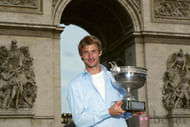
To those who followed Tennis closely in the first decade of the new millennium, seeing Juan Carlos Ferrero’s name on this list might probably seem shocking. However, it would be hard to deny that the Spaniard’s career, in the aftermath of his hour of glory when he held aloft the Roland Garros Trophy in 2003, left a lot to be desired for.
Following his triumph in the French Open in 2003, Ferrero ascended to the top of the ATP Rankings in September 2003, only to squander it after a meagre eight weeks. A six-match losing streak and a lacklustre display at the Davis Cup meant that he ended 2003 ranked number 3.
What followed was nothing short of a prolonged nightmare. His losses kept on piling even as he began a one-way journey downwards on the ATP rankings table. A spate of injuries, cobbled with his inconsistency saw Ferrero go without a title for a staggering six years before the title drought ended in 2009, a year that he ended at No.23, a whopping 32 spots higher than the previous year.
This resurgence, though was short-lived, as his career soon floundered owing to injuries to the knee and wrist. He ended his career ranked 161 after losing to Nicolas Almagro in the first round of Valencia Open 500 in October 2012.
#2 Gaston Gaudio (Argentina)
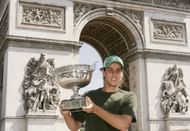
Gaston Gaudio’s triumph at the Roland Garros in 2004 is, as the cliche goes, the stuff that fairy tales are made of. If he is honest to himself, he would be wont to admit that he, least of all, wouldn’t have expected to be crowned the victor in an event that was dominated by Argentines, ranked much higher than he. However, the fairy tale didn’t last long, as he lost to David Ferrer in the fourth round at the French Open in 2005 before he eventually lost his top 10 ranking the following year.
Roland Garros 2004 witnessed a slew of Argentinians, each vying with the other for the title. David Nalbandian and Guillermo Coria were counted among the tournament favourites but Gaudio’s wasn’t the name on everyone’s lips. Coria, in particular, was at the very apex of his career, coming into the tournament ranked a career-best No.3. But, it was the unsung and even unheralded Gaudio who had the last laugh as Coria came undone in a dramatic title clash that left the latter both physically and mentally drained.
With a game that was easy on the eye, Gaudio had little trouble endearing himself to the teeming crowd at Roland Garros in 2004, and following a facile win against compatriot and eighth seed David Nalbandian in the semi-final, he had shown that he was no pushover.
The final against Coria, however, was an anticlimax. While Coria held the upper hand in the first two sets, even handing Gaudio a bagel in the first, he was seized by cramps and although he displayed immense courage in continuing to fight on, he couldn’t stop Gaudio from winning the title.
Gaudio became the first Argentinian to win a Grand Slam since Guilermo Vilas in 1979. His career, however failed to touch the dizzying heights again, with his ranking dropping as low as 1025 in June 2011. He called time on his career on 31st August, 2011.
#3 Thomas Johansson (Sweden)
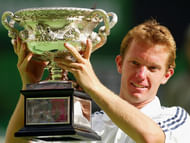
It was in his 25th appearance at a singles Grand Slam event, at the Australian Open in 2002, that Thomas Johansson finally realised his dream of winning a singles Grand Slam title, beating the overwhelming favourite and ninth seed Marat Safin in four sets, 3-6, 6-4, 6-4, 7-6.
Having turned professional in 1993, Johansson’s career was no stroll in the park, but one that involved toil and a good deal of drudgery. The triumph in the Australian Open saw him attain his highest ever ATP ranking, 14 in June 2002.
When he was on top of his game in 2002, a knee injury kept him out of tennis for nearly a year and a half. He recovered from what had seemed like a career ending injury and even made it to the semi-final in Wimbledon 2005, and even went on to an ATP tournament in St.Petersburg later that year.
The win at St.Petersburg was to be his last, as his career post 2005 spiralled downwards, with him eventually ending 2006 ranked 71. The Silver medal that he won for Sweden in the doubles event at the Beijing Olympics in 2008 might have given him some cheer but his ATP rankings continued to slide downwards and he decided to hang up his boots in June 2009, his ATP ranking was 231 at the time of his retirement.
#4 Albert Costa (Spain)
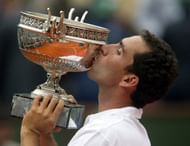
Not even the most daring punter would have bet on Albert Costa to win the French Open in 2002. Heading into the event, he had gone for nearly three years without a single tour title against his name and the odds were clearly stacked against his favour. But the Spaniard defeated two-time defending Champion Gustavo Kuerten in the fourth round in straight sets to have everyone sitting up straight and take notice of him. He bested compatriot Juan Carlos Ferrero in the final in four sets to etch his name onto the trophy.
The win saw Costa’s ranking soar to an all-time high of six. However, he failed to defend his title losing to eventual champion Ferrero in the semi-final. Costa’s career was dogged by inconsistency. Although he never won a single major in that period, his best years were between 1995 and 2000, when he went on to win 11 tour titles.
Although he did win his only doubles tour title in 2005 in Doha, when he partenered with Rafael Nadal, success on the singles circuit eluded him, with his ATP ranking on a one-way downward slide. He ended the year 2005 with a singles ranking of 116 and in April 2006, citing recurring injuries, he announced his retirement.
#5 Adriano Panatta (Italy)
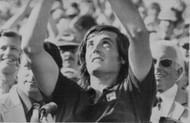
In an age when Bjorn Borg looked invincible on both grass and clay, Adriano Panatta succeeded in toppling the unstoppable Swede twice on the clay of Roland Garros. In fact, he achieved this feat twice, first in 1973, when Borg hadn’t yet started rewriting history books and for the second time in 1976, when the Swede was the two-time defending champion in the quarter-final. Panatta eventually went on to win the Roland Garros title in 1976, defeating Harold Solomon in four sets in the final.
Panatta’s record at the other Grand Slam events, however, is not very impressive. At wimbledon, he never got past the quarter-final stage while he only managed to reach the fourth round at the US Open. His title defence in 1977 ended when he was defeated by Raul Ramirez in the quarter-final.
Panatta retired three years after he won his tenth and last career title at Florence in 1980. Panatta will forever be remembered as the only player to have defeated Borg at the French Open.